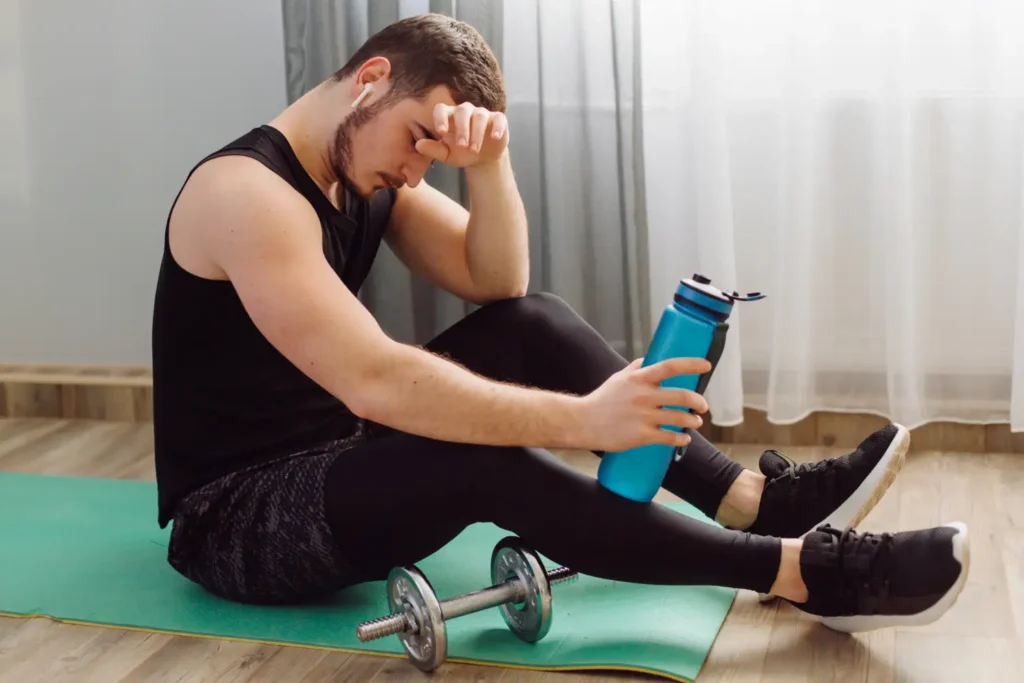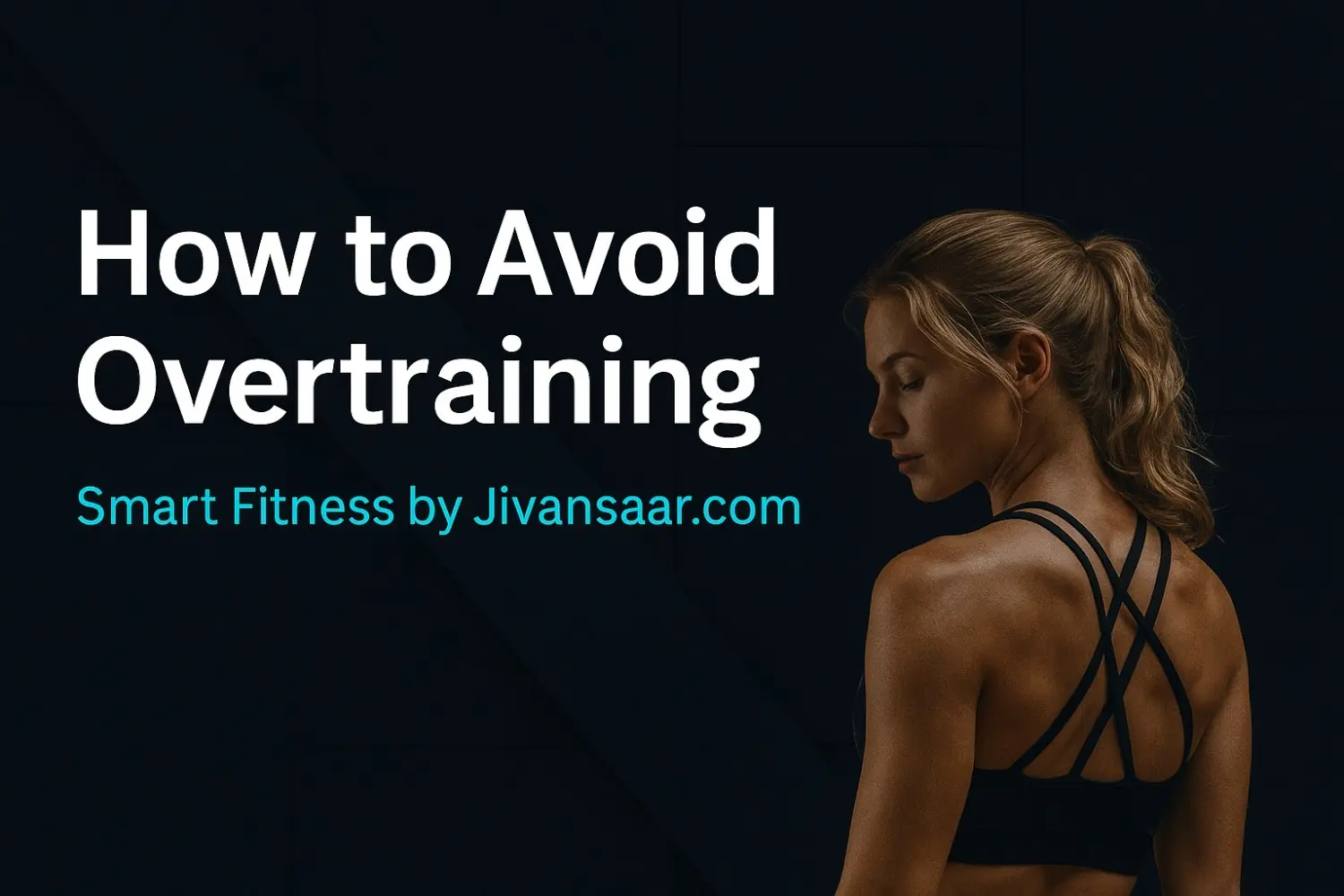At Jivansaar, we engage with thousands of fitness enthusiasts each month, and we consistently observe a shared, unintended pitfall: overtraining. From structured gym regimens to HIIT protocols and independently devised home challenges, excessive volume and intensity undertaken without adequate recovery increasingly undermine the very health the practitioners seek to enhance.
In response to the recurring, heartfelt inquiry we receive—“What safeguards can I adopt to prevent overtraining while sustaining durable commitment?”—this blog distills our collective expertise into actionable guidance infused with empathy and prudence.
What is Overtraining and Why Should You Care?
Overtraining occurs when training volume or intensity exceeds the physiological capacity for recovery, leading not to improvement but to systemic decompensation across physiological, psychological, and emotional domains. The consequences extend well beyond transient muscle soreness, manifesting in disruptions to multiple homeostatic systems.
Among the notable sequelae are:
- Dysregulation of the hypothalamic-pituitary-adrenal axis and gonadal hormones
- Affective disturbances, including increased irritability, heightened anxiety, and depressive episodes
- Disruption of circadian architecture and sleep architecture
- Suppressed immunologic competence, evidenced by increased incidence of upper-respiratory-tract infections
- Enduring fatigue that is disproportionate to training demands
- Cognitive lethargy and emotional disengagement, or mental burnout
Perhaps the most insidious aspect of overtraining is its insidious onset; the encroachment of negative adaptation may remain masked by acute training-induced euphoria until the organism reaches a decompensatory threshold.
Thus, the imperative of preventative stratagems against overtraining is not a matter of choice but of fundamental necessity for sustainable athletic health and performance enhancement.
Tip #1: Listen to Your Body – Your Best Fitness Coach

Many individuals lean on commercial fitness applications, popular influencers, or strict training templates for direction. At Jivansaar, however, we contend that your own physique serves as the most insightful coach, provided you cultivate the habit of attentive self-observation.
Follow this approach to detect and deter overtraining by interpreting the body’s covert communications:
Protracted soreness: When muscular discomfort persists unrelieved for longer than 48 hours following a session that did not include extraordinary effort, the signal merits close attention. This prolonged discomfort represents a biological plea for adequate recuperation and the necessary duration for myofibrillar repair.
Steady fatigue: A constant sense of depletion that lingers throughout the day—despite a sufficient duration of restorative sleep and balanced nutrition—constitutes another compelling warning. Such pervasive exhaustion suggests that the physiological machinery dedicated to recovery is being outstripped by the cumulative toll of training loads.
Emotional turbulence: Regular, uncharacteristic irritability, anxiety, or emotional destabilization—particularly when unrelated to contextual stressors—counteracts the intended mood-enhancing benefits of exercise. In such instances, overtraining may be imposing excessive strain on neuroendocrine pathways, driving hormonal fluctuations and compromising psychological equilibrium.
When physical activity begins to feel burdensome and no longer generates eagerness, it typically indicates mental fatigue rather than a character failure. This felt shift, characterized by a diminished drive, frequently precedes true burnout, suggesting the urgent need for intentional deceleration and mental realignment. Quality rest, essential for recovery and hormonal homeostasis, is compromised when sleep is fragmentary; persistent fatigue upon waking, despite previous daytime exhaustion, often reveals the body is locked in a stress-response mode sustained by excess training. These phenomena should be interpreted as clinical approximations, not as moral failings.
To counteract these signs, Jivansaar advises the following: designate an immediate “no training” day whenever soreness or heaviness persists. The psychological risk of defaulting to a structured program outweighs the marginal gain of a single session; proactive recovery outweighs the theoretical cost of a missed lift. Redirect the discretionary hours of the missed workout toward low-stress practices such as focused breathwork, reflective writing, or gentle walking in a natural environment; these modalities foster homeostasis and neural rest without mechanical load.
Finally, recalibrate the conception of progress: adaptive change rests not in accumulating repetitions but in the fidelity of inter-session recovery. Structural gain occurs in the hours post-exertion, as macromolecules are repaired and homeostatic hormones are rebalanced. Thus, preventative strategies in the management of overtraining commence with attentive respect for the body’s communicative signals.s you.
Tip #2: Integrate Recovery into Your Training Blueprint
Athletes executing synchronized drills. Muscular yet supple bodies engaged in mobility routines. Simplified vector art suitable for educational slides or strength-and-conditioning lectures.
While most athletes meticulously log sets, quantify power output, and monitor kilocalories, they often neglect the equivalent logarithm of recovery. Omitting structure here invites acute fatigue and chronic stagnation.
At Jivansaar, our philosophy posits recovery as the steel framework around the diamond of performance: absent in the specifications, invisible during the lift, yet irreplaceable when the record is forged.
To organize your week most effectively:
1–2 complete rest days each week should be sacrosanct, never as cheat days nor a cause for guilt. In this time, your muscles reconstruct; your joints restore their spacing; and your mental focus resets. Absent these intervals, continued gains will plateau or reverse.
In place of total inactivity, integrate active recovery. Gentle movement—walking, swimming, or restorative yoga—promotes blood circulation, expels byproducts of exertion, and hastens tissue repair. Think of it as recovery through motion, rather than through stillness.
Prioritize sleep hygiene as your cornerstone of recovery. Establish an evening ritual: lower ambient lighting, turn off screens, and calm your mental chatter. Even an additional half-hour of undisturbed sleep can enhance tissue reparation and hormone regulation.
During recovery days, emphasize anti-inflammatory nutrition. Incorporate turmeric, ginger, dark leafy vegetables, and berries; their bioactive compounds moderate the inflammatory response that strenuous training can provoke. By smoothing this reaction, you hasten recovery and strengthen your long-term wellness.
Adhering to this cadence of deliberate rest, moderate movement, disciplined sleep, and prudent nutrition will form the most logical and sustainable bulwark against the overtraining that undisciplined schedules invite.
Tip #3: Eat and Hydrate Like You Truly Care

Nutrition constitutes the cornerstone of bodily recuperation. Inadequate dietary intake prohibits cellular repair and muscular adaptation, resulting in a net decrement in performance across successive training sessions. The perceived loss of strength after an effort underscores a misalignment between expenditure and restorative input.
The antidote to the overtraining syndrome—while securing progressive training adaptation—lies in the design of a nutritional regimen attuned to quantitative and qualitative demands. Thoughtfully calibrated macronutrient, micronutrient, and fluid intake fortifies tissues, modulates systemic inflammation, and sustains the anabolic milieu, thereby serving as the most effective safeguard and accelerant for continued gains.
Essentials for Recovery:
- Protein: Muscle repair and resilience Muscle tissue is continuously remodeled, and extracellular repair is most efficient when protein intake is adequate. Following resistance exercise, muscle fibers sustain microtrauma that is repaired and hypertrophied only when exogenous protein supply exceeds catabolism. Incorporate paneer, lentils, tofu, eggs, and lean meats into each post-exercise meal to facilitate this process.
- Complex Carbohydrates: Sustained fuel Muscle glycogen is the principal energy reserve for both high-intensity and endurance activities. Replenishing these stores requires a slow, steady supply of glucose, which is best sourced from complex carbohydrates. Whole grains, such as brown rice and oats, as well as starchy vegetables like sweet potatoes, permit not only recovery for the next workout but also support daily systemic energy demands.
- Healthful Lipids: Joint protection and hormonal homeostasis Lipids are indispensable for steroid hormone synthesis and for attenuating exercise-induced inflammation in synovial tissues. To fortify recovery, include moderate amounts of monounsaturated and polyunsaturated fats such as almonds, ghee, extra-virgin olive oil, chia seeds, and avocado. These fats facilitate both hormonal equilibrium and articular mobility.
- Antioxidants: Mitigation of oxidative load Intensive training elevates reactive oxidative species to levels that can harm cellular membranes, DNA, and intracellular signals. Antioxidants counteract this imbalance and also enhance leukocyte function and tissue synthesis. Green leafy vegetables, assorted berries, amalaki, and turmeric contain high-density phytochemicals that quench oxidation and may alleviate the cumulative sequelae of excessive training volume.
Don’t Forget Hydration:
Dehydration leads to muscular cramps, persistent fatigue, and protracted recovery times.
Begin your day with a glass of warm lemon water to stimulate digestive function.
Aim for 2.5 to 3 litres of water daily to ensure joint lubrication and cellular hydration.
After any sustained period of intense sweating, incorporate electrolytes to reset sodium and potassium levels.
Jivansaar recommendation: Utilize copper vessels—where ancient tradition and contemporary inquiry converge. Water held in copper vessels may enhance metabolic efficiency and modulate inflammatory processes.
When athletically-minded individuals inquire how to bypass overtraining through natural means, our singular, preeminent counsel is this: enhance nutritional intake and fortify recovery practices.
Long-Term Effects of Ignoring Overtraining
Still questioning? Here’s what prolonged overtraining inflicts—on even the most driven and otherwise healthy athletes:
Physical:
- Recurrent injuries from microtrauma that never enough time to heal
- Stiffening joints battered by endless load and no recovery
- Muscle tissue eroded as the body starts cannibalizing itself
- Perpetual fatigue that lingers despite back-to-back rest weeks
- Bone density erosion, especially in women, from stress-altered hormones
Mental:
- Persistent fog that dulls focus and turns simple tasks into chores
- Clobbered attention and evaporated creativity
- Shifting moods that fray friendships and erode self-worth
- Anxiety or low moods fed by the relentless pressure to keep pushing
Hormonal:
- Women: Cycles gone haywire, missing periods, fading fertility
- Men: Dipping testosterone, rising irritability, lost sex drive
Avoid overtraining? Start by acknowledging that it’s real.
Bonus from Team Jivansaar: 5 Recovery Rituals We Actually Do
Gentle morning stretch + 5 deep breaths (5 min): This wakes up tight muscles, chases off early-day stiffness, and hits the nervous system’s reset button so body and mind can soften.
After each session, note 1 feeling in your body: Just one line in your notebook helps you notice the signals you usually skip. Over time, this tiny habit spots both tightness and ease, quietly steering you away from overdoing it.
Foam roll + massage, weekly: Forward-fold over a foam roller or knead your calves and shoulders for 20 minutes each week. Letting muscle knots go means smoother range of motion and less chance of strain.
One screen-free night: Pick a weeknight, tuck your devices away, and feel your nervous system downshift. Sleep hormone rhythm steadies, so you wake ready to hit the ground running.
One detox brew, daily: Combine a pinch of haldi, 3 leaves of tulsi, 1 slice of ginger, and a squeeze of lemon in hot or cold water. This tongue-simple drink rinses inflammation off your body and quiets your mind.
These micro-moves stack up for us, and they can quietly stack for you too. When your lifestyle gently listens to your body, overtraining drifts quietly out of reach.
Final Words from the Jivansaar Team
We aren’t trying to shock you. We’re trying to nudge you: Real fitness lifts you—never drains you.
You don’t have to sweat like a pro to feel powerful. Train thoughtfully, rest regularly, and pay quiet attention.
That’s the Jivansaar way—clear, calm, and lasting.
Want to dig deeper? Swing by Jivansaar.com for straightforward, strong ideas on:
- Self-Improvement
- Health & Wellness
- Productivity
- Real-life balance
Frequently Asked Questions (FAQs)
What is the fastest way to avoid overtraining?
Jivansaar’s take: the fastest route is to weave recovery into your routine the same way you schedule reps. We usually suggest locking in 1 to 2 full rest days every week, prioritizing sleep, and choosing foods and hydration that support recovery. Treat rest like another workout—just without the visible sweat.
How do I know if I’m overtraining?
At Jivansaar we’ve learned that overtraining rarely pounds on the door; it hitches a silent ride into your routine. Persistent tiredness that drags into your second rest day, irritability that swaps one mood for another, restless nights, soreness that settles in for days instead of hours, and the sudden shrug when you see the gym door—each detail tells a story that we pay attention to. None of these are weakness or excuses; they’re your system saying, “I need a time-out, not a harder workout.”
Can I still make progress with fewer workouts?
Jivansaar Answers: Definitely—and honestly, that’s the wiser approach. Fewer, thoughtfully designed sessions combined with intentional recovery yield real growth over time. Our coaches keep witnessing the same pattern: lasting results come not from pushing hard daily, but from finding and maintaining a smart, steady rhythm.
Is active recovery better than full rest?
Jivansaar Answers: We’re convinced each approach contributes meaningfully. Days spent fully resting grant the body the opportunity to mend on a cellular level, while gentle activities—like swimming, gentle yoga, or relaxed walking—boost circulation and support that repair. We suggest incorporating a blend of the two within your weekly schedule to achieve the best possible recovery.
What foods help most with recovery?
Jivansaar Answers: Recovery thrives on foods that feed your body and calm unwanted inflammation. Start with protein: paneer, lentils, eggs. Add complex carbs: oats, sweet potatoes. Then sprinkle in nature’s healers: turmeric, ginger, amla, leafy greens. And, of course, drink up—staying hydrated is a must. Remember: at Jivansaar, we trust that your plate can be the best medicine.

Leave a Comment